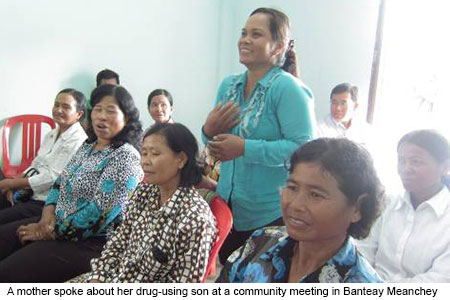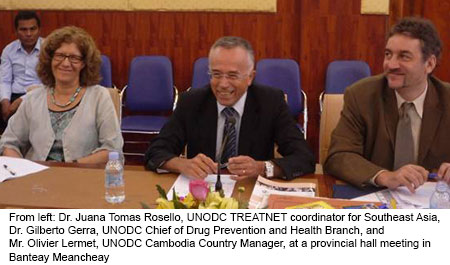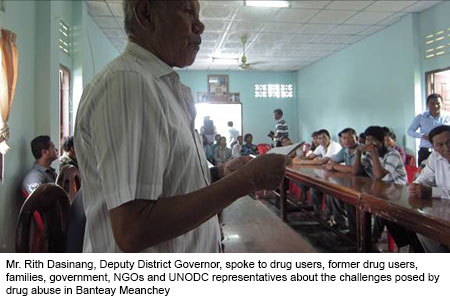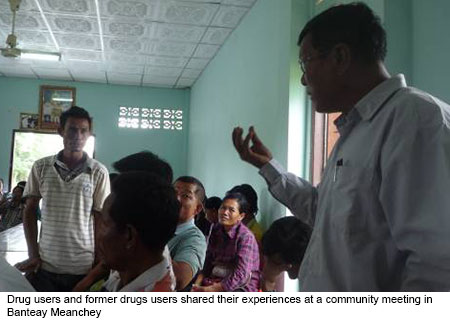
Banteay Meanchey, 18 June 2013 - The trafficking and abuse of illicit drugs is a significant and worsening problem in Cambodia, particularly the use of amphetamine-type stimulants (ATS). Methamphetamine pills are the most widely used drug in Cambodia, although crystalline methamphetamine, more easily accessible, is on the rise. Recent consensus between the Royal Government of Cambodia and technical partners suggests that approximately 13,000 people use drugs in Cambodia, 77 per cent of whom are below 26 years of age.
The majority of these drug users smoke crystal methamphetamine or a cheap combination drug commonly known as "Yama". These drugs are highly addictive and cause serious long-term effects, including insomnia, tremors, anxiety, paranoia, and aggressiveness.
"Drug users find themselves in a vicious circle," notes Dr. Chhum Vanarith, Director of the Provincial Drug Control Committee. "This leads to negative health and development consequences, for the individual, their family and community, and for the country."
Banteay Meanchey province attracts migrants from provinces throughout Cambodia looking for work across the border in Thailand. The combination of poverty and hard manual labor makes the province a hotspot for drug use and associated negative consequences on health, wellbeing, and development.
In response to this concern, the pilot phase of Cambodia's UNODC-supported Community-Based Drug Treatment (CBTx) programme was launched in 2010 in Banteay Meanchey Province to provide drug users with voluntary, cost-effective, and rights-based drug treatment and care services in their communities.

This promising collaborative effort by the Royal Government of Cambodia, UNODC and partners, which assists approximately 1,306 people in three provinces to reduce drug use and facilitate reintegration, was recently assessed by Dr. Gilberto Gerra, UNODC Chief of Drug Prevention and Health Branch, based in Vienna. During his visit, Dr. Gerra met with community members, local authorities, and Government partners.
"Community-based drug treatment is a revolutionary, sustainable alternative to compulsory treatment centers in this region," said Dr. Gerra. "The CBTx programme provides drug users with voluntary, cost-effective and rights-based drug treatment and care services in their home communities.
"Drug users and their families no longer need to be desperate and ashamed, because the community now takes care of them."
The CBTx Programme, which is supported by a Global UNODC/WHO
joint programme on drug dependance treatment, has now grown to provide access to health services across 24 communes, with over 253 trained staff available to provide health screenings and treatment services at four referral hospitals and fifteen health centers.
As part of his mission to provide evidence on CBTx's impact, Dr. Gerra met with programme supporters from
UNODC's Global TREATNET programme, the World Health Organization (WHO), and national and provincial government representatives, including Mr. Ke Kim Yan, Deputy Prime Minister and Chair of the National Authority for Combating Drugs (NACD), who highlighted strong government support for CBTx.
"CBTx in Banteay Meanchey is a good model," said Mr. Ke Kim Yan. "Cambodia's new National Strategic Plan on Drug Control fosters the CBTx approach, as it includes treatment, rehabilitation, and re-integration as one of its five priority strategies."
Similarly, Dr. Mam Bunheng, the Minister of Health, announced that a new Department on Mental Health and Substance Abuse underway would strengthen the national Mental Health and Drug Dependence Programme and support CBTx objectives. An expansion of the community-based treatment to prisons has also been discussed.

According to Mr. Rith Dasinang, Deputy District Governor, CBTx demonstrates community-wide changes in perception regarding drug use. With support from local authorities, local communities, members of the health sector and NGOs have helped reducte the stigma towards drug users and fostered an environment for service delivery.
Mr. Olivier Lermet, UNODC Cambodia Country Manager, said that the Banteay Meanchey programme could be used as an example for the region.
"The fact that drug users and their families, police officers, government, NGOs, and UN representatives are talking openly about the problems of drug use is an important achievement," said Mr. Lermet. "Small steps like this bring about change, and other provinces, even countries, can learn from this."

Background:
UNODC Cambodia partnered with Cambodian government authorities, including the National Authority for Combating Drugs, the Ministry of Health, and the Ministry of Social Affairs, Veterans and Youth Rehabilitation to support the CBTx programme. UNODC also joined forces with other UN agencies, including WHO, UNAIDS and UNICEF, as well as with other non-government organizations to deliver the programme. Supported by Sweden and the United States/INL (through the Global TREATNET programme and the Global Joint UNODC-WHO Programme on Drug Dependence Treatment), the community-based treatment programme is currently implemented in three provinces and expected to expand nationwide by 2016.
|
|
|
|